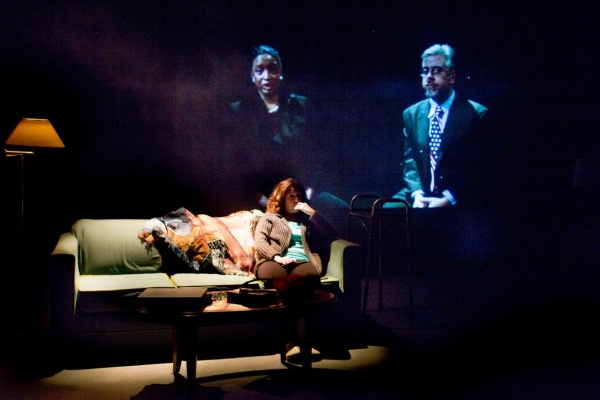The Unlikely Ascent of Sybil Stevens

(© Kacey Anisa)
There are only 14 people who have ever walked away the sole survivor of a commercial plane crash. This sobering statistic hovers over the extraordinary circumstances behind Kari Bentley-Quinn’s The Unlikely Ascent of Sybil Stevens at the Secret Theatre. While I can think of few things more terrible than dying in a fiery plane crash, surviving when everyone else perishes has the potential to be a lot worse.
Sybil Stevens (Jennifer Gordon Thomas) is a Chicago-based flight attendant. She's the lone survivor of Ascendant Airlines flight 567, which crashed tragically in Utah, killing 266. Nearly a year after the event, Sybil is surprisingly coolheaded about the whole affair, even though her experience has turned her into the subject of a national media frenzy. When Valerie (Samantha Fairfield Walsh), a researcher for the Tessa MacKenzie Show, tries to convince her to come on TV, Sybil is hesitant. Her nephew, Derek (Jordan Tierney), is far more enthusiastic about the prospect, telling her, "You know that people aren’t going to leave you alone until you do this, right?" He’s been regularly blogging about their lives, receiving e-mails from thousands of readers worldwide. Meanwhile, Joe (Sean Williams), the paramedic who carried Sybil away from the crash site, makes a surprise visit to Chicago. Sybil wonders why he isn’t home with his wife and kids.
As Sybil, Thomas offers an incredibly realistic portrayal of a no-nonsense Midwestern mom. Her harsh vowels adorn the maternal tenderness she shows Derek (who she’s raised for the last five years while his mother is in prison). Still, she suffers no fools and has little time for cheesy sentimentality. "Oh, honestly," she says with an eye roll when Joe confesses his love for her on national TV. It’s like she’s watching a particularly dopey film that just happens to be about her life. This wins her few fans among the moralizing daytime TV crowd, who are just looking to be touched by an angel with an inspiring and soft-lit "true" story.
Sybil is utterly unwilling to offer this catharsis, the ablution in tears that the cameras so desperately crave. When Valerie asks about the source of her survival, Sybil flatly answers, "It wasn’t God. I know that much," echoing Tornado survivor Rebecca Vitsmun, the woman who dared to reject the national media narrative of "simple God-fearing folk in extraordinary circumstances," much to the surprise of Wolf Blitzer. This makes her extremely likable. In fact, with the possible exception of opportunistic TV host Tessa MacKenzie (Yeauxlanda Kay playing a convincingly gross Oprah Winfrey knockoff), you get the feeling that everyone in this play is a nice person.
Yet the thing that makes Sybil and her circle so amiable is also the thing that leads this show to meander: For a play about a massive plane crash, there are precious few fiery explosions in the script. This is by no means "edge-of-your-seat" drama. The one exception comes in Tierney, who carries a certain erratic teenage physicality that feels dangerous and unpredictable. His confrontations with his aunt feel real, and you worry that this undeniably good kid could crash and burn at any second.
Director Christopher Diercksen should be applauded for leading his ensemble to such rich and nuanced performances. His blocking, which occasionally takes place in the downstage "voms" of the stage, leave much to be desired (or even seen by a good portion of the audience). The design team uses sound and projection to fill in the gaps of the story: Kevin Brouder’s live video feed helps create the feeling of a TV studio (on a budget). Beth Lake’s sound design gives us a sense of place without being too disruptive (the sound of the Chicago L train running by the apartment is a constant companion).
Bentley-Quinn has written a sensitive and intelligent play about an extremely fraught situation. While there is tremendous value to such a clear-eyed assessment, it tends to drag in the second act as the play struggles to conclude. It is not at all what one would expect from a play about a horrifying air tragedy.











